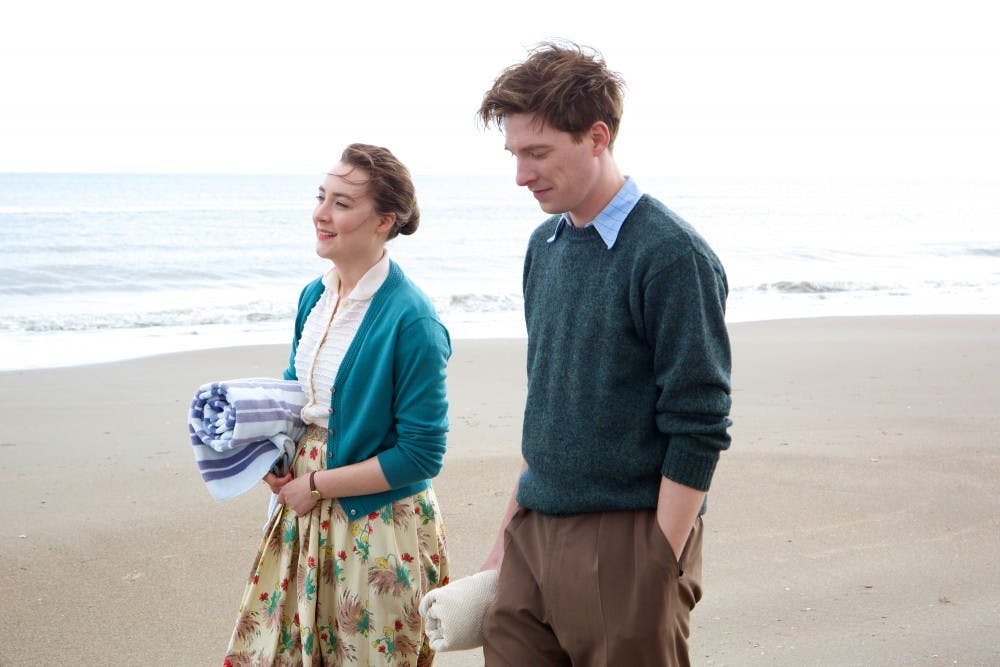John Crowley’s “Brooklyn,” based on the Colm Tóibín novel of the same name, is a special piece of cinema without being new or dissociating itself from the countless meandering and bland period films released each year.
Based in the 1950s and following the ventures of Eilis Lacey (Saoirse Ronan), “Brooklyn” is averageness perfected and exemplifies that sincerity, wit and, above all, charm can exalt subtle, acting-centric dramas. Maybe even more importantly, “Brooklyn” is a film made to be enjoyed; it gracefully combines enough artistic ideas and reservations with equal amounts of joy and reward for its viewers.
Eilis is a young woman lacking opportunities in southeast Ireland, where she lives with her mother and older sister, Rose, until the local church arranges for her to start a new life in Brooklyn, New York. Eilis struggles to leave her family, but her quiet quest for independence sends her across the Atlantic to live in a boarding house ran by the intense, unintentionally hilarious and incredibly Catholic Mrs. Keough (Julie Walters). Eilis’ homesickness only starts to dissipate when she starts dating the goofy and affectionate Italian, Tony (Emory Cohen).
Between Cohen and Ronan, there is enough grounded charm to go around. In fact, their relationship, which has its awkward moments and hiccups, is electric and I couldn’t help but feel a warm fuzziness in my stomach — a rare feeling in movies and fails to materialize in most romances. Without this chemistry, “Brooklyn” would likely be criminally boring and all too familiar.
Cohen’s Tony is entirely different than his breakout performance as the drug-abusing, felonious teen A.J. in Cianfrance’s “The Place Beyond Pines.” Cohen is vibrant as the "boy next door you bring home to meet your mother" nice guy Tony. His charm drives the second act, but it never overshadows the main star.
At its heart, “Brooklyn" is Eilis’ immigration story, but her homesickness, along with her sister Rose’s untimely death, was enough to bring her back to Ireland despite the life she started with Tony. Her short trip gradually gets longer as she settles into the routines of her old life in Ireland and is caught up with a distant boy from her youth Jim Farrell (Domhnall Gleeson).
Ronan proves herself a master of subtlety as she melts into Eilis and explores her growth and blossoming adulthood. Ronan’s performance far surpasses her age, realizing Eilis’ homesickness and her inner turmoil caused by having two lives in separate places.
“Brooklyn” isn’t just a lovely story with endearing actors, but it is also a gorgeous costume drama with lively sets true to the period and bright cinematography done by Yves Bélanger ("Wild," "Dallas Buyer’s Club"). The dresses, pant suits and outfits are also clever. Costume designer Odile Dicks-Mireaux employed the color green to represent Ireland throughout, especially when Eilis is faced with overbearing homesickness.
Although the screenplay sometimes comes off as a bit too “written” and witty for the characters, the interactions in “Brooklyn” are exciting and easy on the ear. There is a delicious instance of parallelism as Eilis passes on the information taught to her before going through immigration to the next Irish girl starting a life in America. Ultimately, this speech ties together "Brooklyn's" most important themes in a slightly self-indulgent but near-perfect way.
“Brooklyn” is inoffensive filmmaking, but is crafted with such tenderness, care and finesse that “inoffensive” is elevated to graceful and sophisticated. At its best “Brooklyn” can warm a heart and reflect on the importance of staying grounded to your roots, and at its worst it is a well-intentioned, layered period film driven by strong performances.
Related links:
Bradley Cooper's 'Burnt' served up as cinematic fast food
A bank robbery and the Berlin club scene collide in one-note 'Victoria'
Reach the reporter at tanner.stechnij@asu.edu or follow @tannerstechnij on Twitter.
Like The State Press on Facebook and follow @statepress on Twitter.




